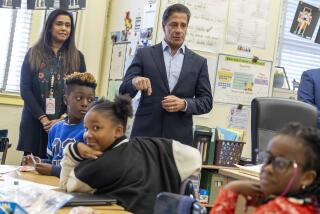Valley Parenting : Tutors Can Give Kids a Boost : Whether a student is having trouble in school or just wants to do better, extra help may be the answer.
- Share via
Johnny, a Van Nuys seventh-grader, could read fine, but math was a problem and he and his mom were constant ly battling over homework.
“He was frustrated because I didn’t teach like his teacher did and because he didn’t really understand it,” says the mom, who requested anonymity to spare her son embarrassment. “Frankly, neither did I.”
So she hired a tutor, and peace was restored.
Parents seek out tutors for either of two reasons: Their child is having difficulty with schoolwork, or he or she is doing fine but wants to do even better.
Frequently, professionals are called only after Mom and Dad have tried first.
“The parent may not have the necessary skills, or is too emotionally involved to effectively tutor his or her own child,” explains Arlene Schneider, a veteran teacher and tutor.
What a parent should do is stay alert to a youngster’s signals.
Often, teachers will contact parents if schoolwork slips, says former teacher Phil Nassief, now an administrator in the Los Angeles Unified School District’s senior high division. Both teacher and parent should also take note when a child’s self-esteem is diminishing. Sometimes, though, signs of distress are subtler.
Westlake student Sean Hirschthal, 10, was doing fine in school, but his mother, Rocio Brenner, suspected that “there was something lacking. I felt he could use some one-on-one attention.”
Having a tutor to work with on reading and writing skills, Brenner says, has made Sean feel special and given him confidence.
Perhaps more commonly, says Robin Boswell, a former teacher who is now director of education for the Sylvan Learning Center in Tarzana, a child may need help if he is not completing homework or just seems to be having a hard time.
After vision or hearing problems have been ruled out, choosing a good tutor is a matter of research and the right chemistry. Experts advise asking friends and teachers for recommendations, calling universities and high schools or consulting the Yellow Pages.
“Make sure tutors are credentialed,” Boswell advises. “Check their background: Is it special education, elementary, high school? Find out how long they’ve been teaching, what materials they will use. Is it the same approach the child failed with before, or something new? Is it one-to-one or a group?”
Schneider, who teaches second grade at Dearborn Elementary School in Northridge, cautions parents to be sure the tutor understands a child’s age group and the particular skills appropriate to that age. “The tutor needs to build rapport with the child,” she says, “and must have a lot of patience.”
Patience and rapport are two things 17-year-old Scott Bishoff depends on when he tutors junior and senior high students in math.
*
“It’s not enough to be good in math,” says Scott, a Granada Hills High senior who has been tutoring for a year and a half. “One kid might get it in five minutes, one in a half-hour. Once in a while you have to drop a certain subject and come back to it later.”
Because of his age, Scott feels, that he has an advantage over parents in working with teens. But whatever a tutor’s background, he or she should start by discussing educational goals with parent and child. Boswell believes that all parties to a youngster’s education should communicate. “We don’t want to create a program totally out of left field from what they’re learning in the classroom,” she says.
Once the tutoring process is under way, it’s important to give it time. One elementary school tutor tells parents not to expect anything for at least six weeks. Eventually, the extra work should begin to show.
Costs for in-home tutoring range from between $10 and $25 an hour for a high school- or college-age tutor to between $30 and $50 for an experienced, credentialed teacher. Educational service centers command varying rates. The cost of eight hours of instruction a month at the Tarzana Sylvan Center, for example, begins at $250.
Most high schools and colleges offer free tutoring to enrolled students. One such option, available in many Valley high schools, enlists California Scholarship Federation students to help their peers.
For children with reading problems, CSUN runs a low-cost, three-semester program through its Los Angeles Times Literacy Center, formerly the University Reading Clinic. Directed by CSUN professors and run by graduate students, the program costs $150 per semester and is geared toward youngsters in grades 2 to 12 who are working below their grade level.
More to Read
Sign up for Essential California
The most important California stories and recommendations in your inbox every morning.
You may occasionally receive promotional content from the Los Angeles Times.













